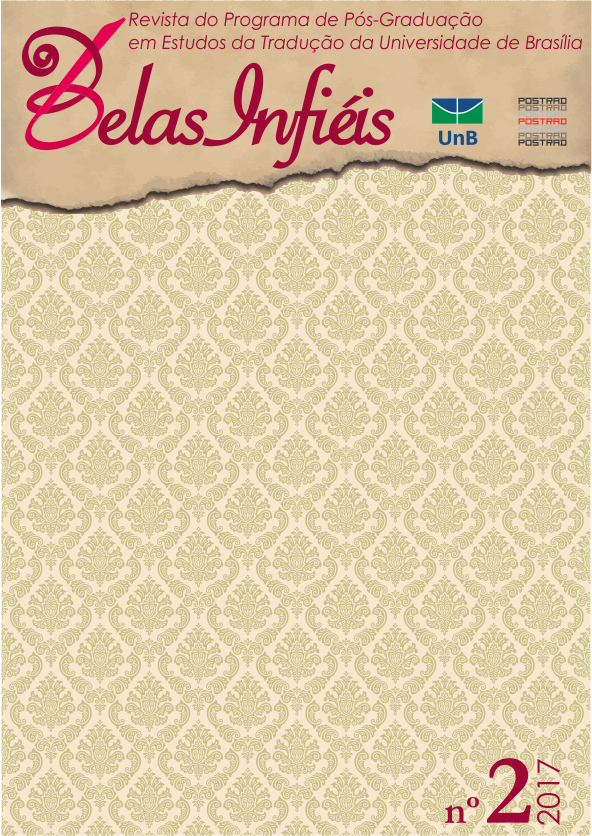O QUE PODEM AS TRADUÇÕES PELA LITERATURA BRASILEIRA?
DOI :
https://doi.org/10.26512/belasinfieis.v6.n2.2017.11451Mots-clés :
Literatura brasileira, Tradução, Intermediários, ObstáculosRésumé
Tendo como ponto de partida os estudos sobre a circulação transnacional da literatura, pretende-se, neste artigo, desenvolver uma reflexão sobre a literatura brasileira no exterior. Mais precisamente, toma-se como foco o contexto francês, problematizando-se alguns obstáculos à circulação da literatura brasileira. O artigo baseia-se em entrevistas realizadas no âmbito de uma pesquisa de pós-doutorado, bem como em depoimentos de atores do mercado editorial, elegendo duas questões centrais como possíveis obstáculos. A primeira diz respeito aos estereótipos relacionados ao Brasil, e a segunda refere-se ao reconhecimento da literatura brasileira no espaço nacional como condição para sua legitimação no exterior. Como já observado em estudos recentes, a maior parte das obras brasileiras atualmente traduzidas são ficções de autores contemporâneos em plena atividade, alguns dos quais recém-ingressos no sistema literário nacional. O processo que resulta na seleção do autor e da obra a ser traduzida supõe uma cadeia de atores, um dos principais, no caso da literatura brasileira, sendo o agente literário, além do editor (tanto no Brasil quanto no exterior), do tradutor, das instituições oficiais (a exemplo da Fundação Biblioteca Nacional por meio de seus editais de apoio à s traduções), entre outros. No que diz respeito aos processos de legitimação, uma vez traduzidas, essas obras encontram dificuldade em atravessar a barreira da invisibilidade e conquistar um reconhecimento internacional. Afinal, não basta ser traduzido; é preciso ser vendido, lido, comentado, enfim, “reescrito” (Lefevere). Os dois obstáculos explorados neste artigo esclarecem alguns aspectos desse processo, ainda que não esgotem a questão.
Téléchargements
Références
BOURDIEU, Pierre. El campo literário. Prerrequisitos críticos y principio de método. In: Criterios, La Habana, nº 25-28, janeiro 1989-dezembro 1990, p. 20-42. Disponível em: . Acesso em: 26 abr. 2016.
CASANOVA, Pascale. La république mondiale des lettres. Paris: Seuil, 1999.
MARTINS, Márcia A. P. O papel da patronagem na difusão da literatura brasileira: o programa de apoio à tradução da Biblioteca Nacional. In: GUERINI, Andreia; TORRES, Marie-Hélène; COSTA, Walter C. (Org.). Literatura traduzida e literatura nacional. Rio de Janeiro: 7Letras, 2008, p. 39-52.
SAPIRO, Gisèle. Globalization and cultural diversity in the book market: The case of the literary translations in the US and France. In: Poetics, nº 38, 2010, p. 419-439. Disponível em: <https://goo.gl/CQ4Gur>. Acesso em: 12 mar 2016.
SAPIRO, Gisèle. Gérer la diversité : les obstacles à l’importation des littératures étrangères en France. In: SAPIRO, G. (Org.), Traduire la littérature et les sciences humaines. Conditions et obstacles. Paris: Ministère de la Culture et de la Communication/DEPS, 2012, p. 201-230.
SOARES, Marianna Teixeira. Entrevista via Skype concedida a Marta Pragana Dantas. Rio de Janeiro/Paris, 10 jun 2015.
TONUS, Leonardo. Entrevista concedida a Marta Pragana Dantas. Paris, 26 jun. 2015.
TORRES, Bolívar. Uma das revistas mais importantes da França, “Le nouvel observateur” falou sobre os escritores convidados ao Salão do Livro de Paris. In: O Globo, 10 dez. 2014. Disponível em: . Acesso em: 26 jun. 2015.
VENUTI, Lawrence. The Formation of Cultural Identities. In: VENUTI, L. The Scandals of Translation. London: Routledge, 1998, p. 67-87.
VILLAS-BOAS, Luciana. Para quem escreve o autor local? In: Folha de São Paulo, 23/02/2014, p. 1-7. Disponível em: <https://goo.gl/M6jW2K>. Acesso em: 24 abr.2016.
WITT, Nicole. Entrevista concedida (via Skype) a Marta Pragana Dantas. Paris-Frankfurt, 22 out. 2015.
Téléchargements
Publié-e
Comment citer
Numéro
Rubrique
Licence
Copyright Statement
Given the public access to this journal, the texts are free to use but requires the recognition of the original authorship and initial publication in this journal to be properly stated.
The journal allows the use of works published for non-commercial purposes, including the right to submit the work to publicly accessible databases. Published contributions are the sole and exclusive responsibility of the author(s).
- When submitting papers to be evaluated by the Belas Infiéis journal, the author(s):
- Declare that the contents of the contributions are original and of their original creation, being entirely responsible for their content if there is an objection by third parties.
- Claim to be aware that they should not commit academic plagiarism.
- Declare that the manuscript has not been published, completely or partially, in Portuguese or another language. If it is a translation it should be submitted to the Translated Articles section.
- Declare that the manuscript is not being evaluated by other journals.
- Declare that the manuscript was not submitted to another journal simultaneously.
- Commit(s) to inform the journal of any kind of error or inaccuracy in their contribution (published, in evaluation or in editing) and to collaborate with the editors to make due corrections of the article (when in evaluation or editing) or erratum/retraction (after publication).
- Declare that there is no conflict of interest regarding the published work.
- Authorize its release if it is accepted for publication without any kind of monetary compensation.
- Agree to assign non-exclusive rights to publication to the magazine, remaining free to make their contribution available in other media as long as the publication of the first version in Belas Infiéis magazine is mentioned. They also authorize Belas Infiéis to assign their texts for reproduction in content indexers, virtual libraries and similar platforms.
- Maintain copyright and grant the journal the right of first publication, the work being licensed under theCreative Commons Attribution License.
- Is/Are allowed and encouraged to publish and distribute their work online after the editorial process, which may increase the impact and citation of the published work.
- Authorize the editorial team to make textual adjustments and to adapt the article to the publication rules, when necessary.



















